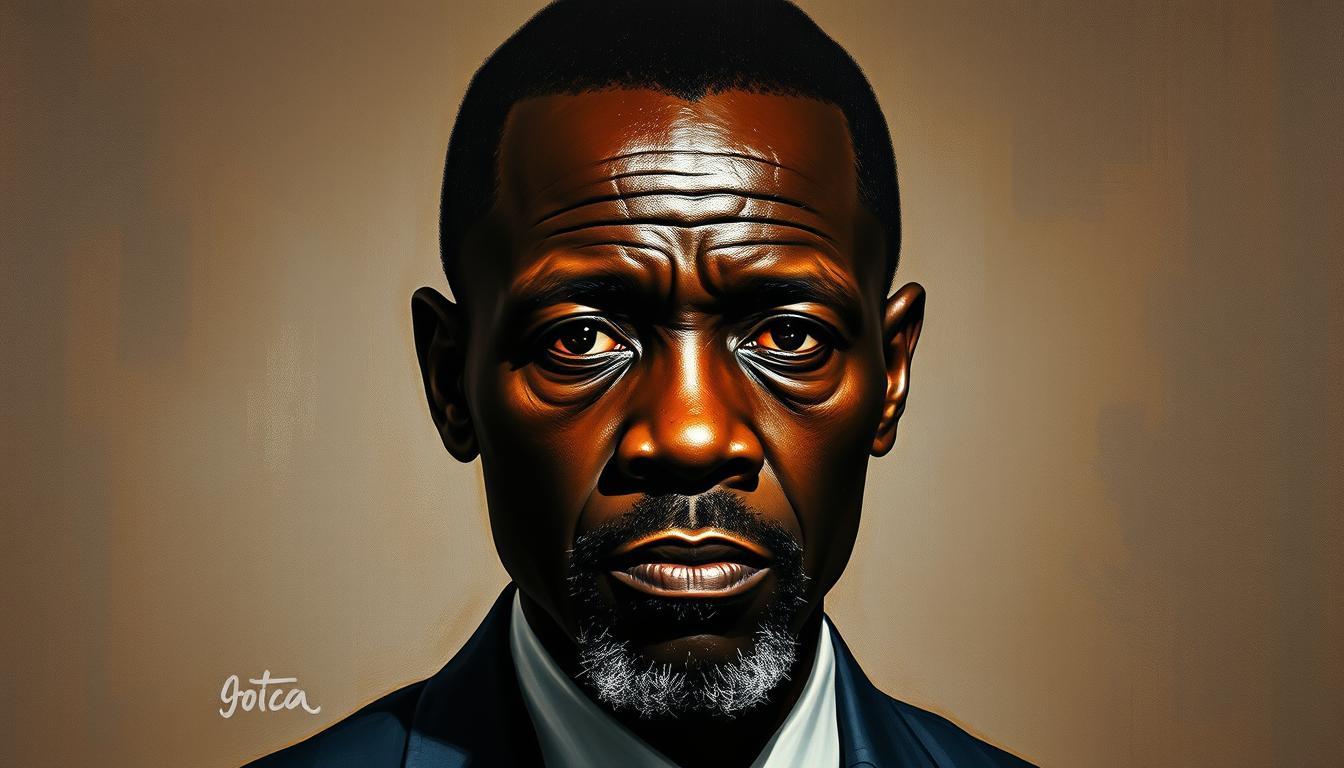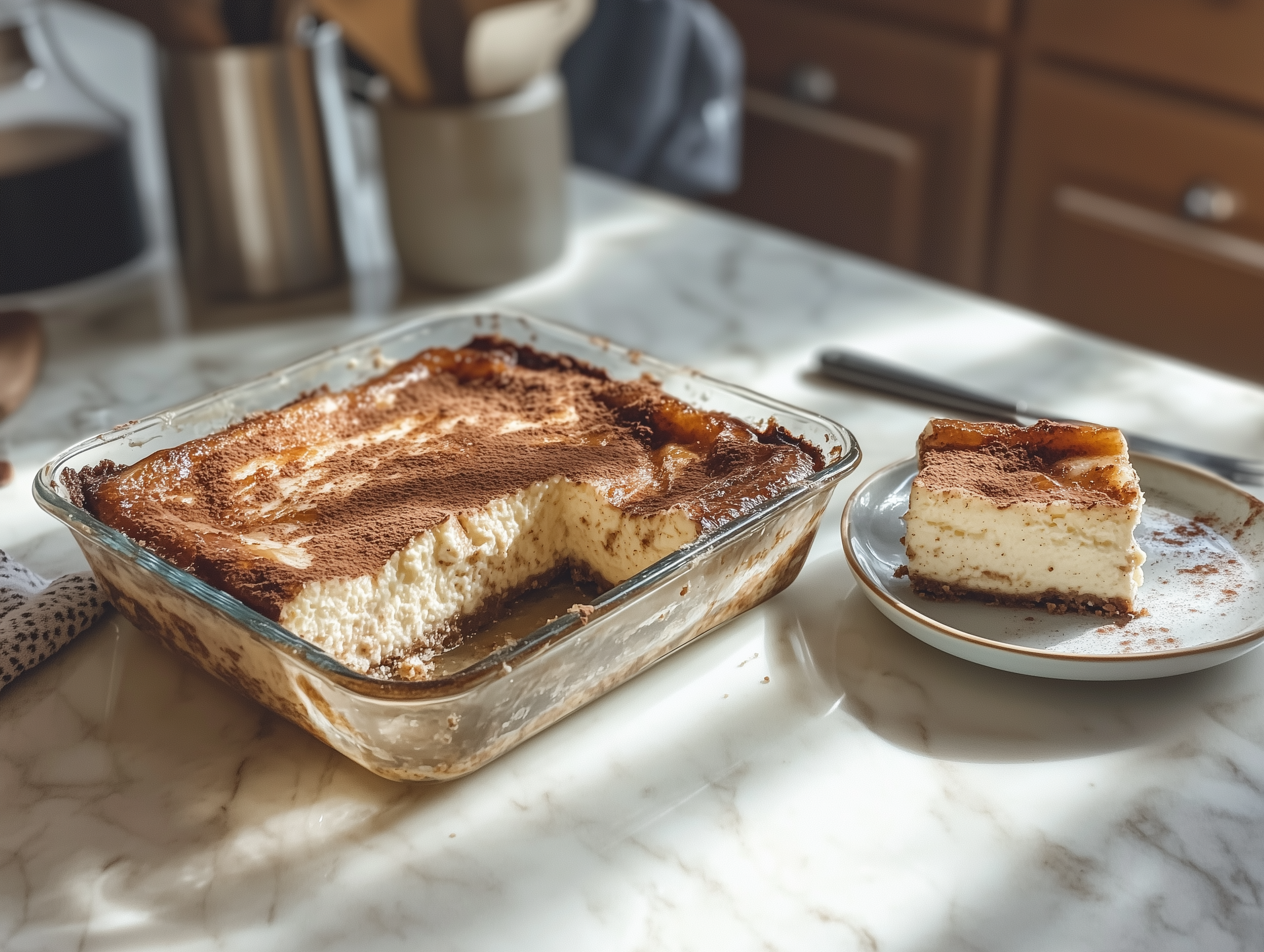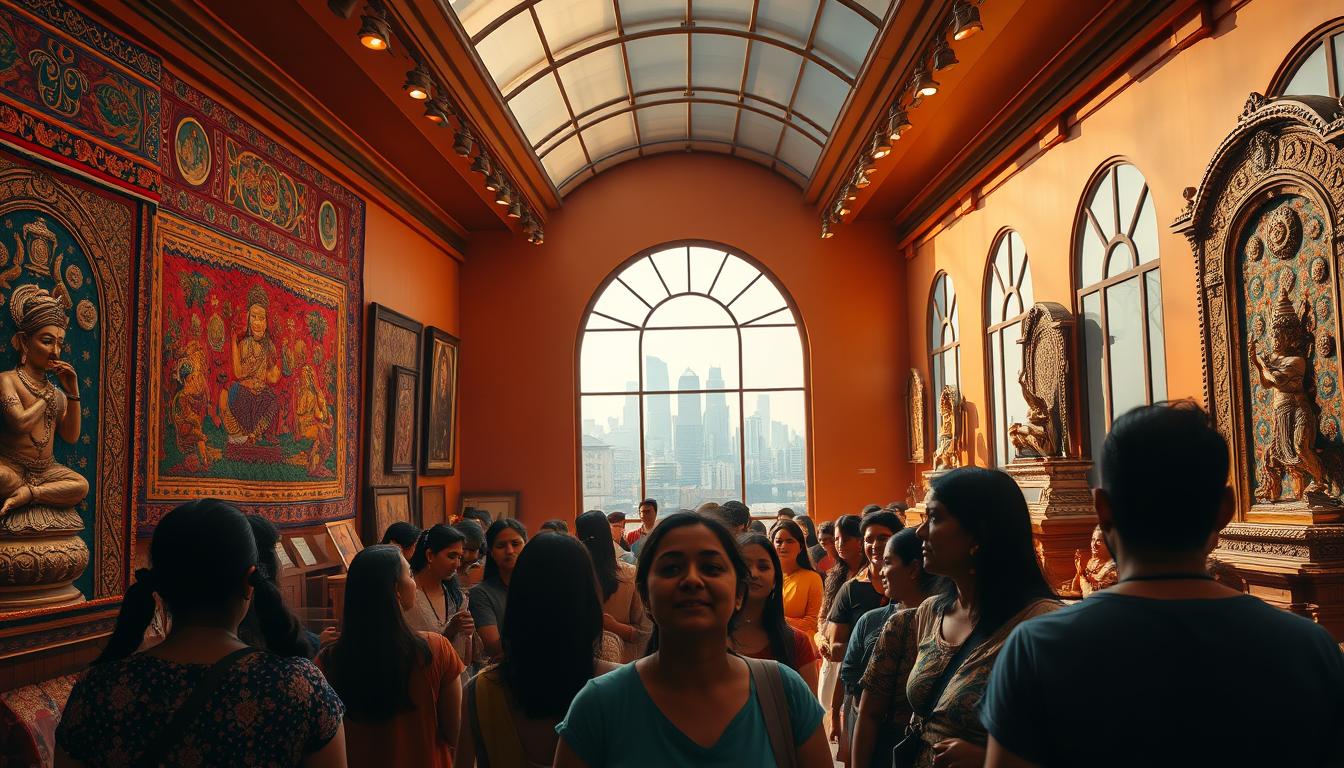I remember the first time I saw an African portrait that amazed me. The colors were vibrant, the details were fine, and the stories were deep. It changed how I saw african portrait art. Every stroke of the brush told a story of culture and heritage.
African paintings are more than just pictures. They show strength, identity, and change. From old traditions to new styles, the african art gallery is a place of discovery.
Exploring african portrait art, I saw how it captures human life. Artists like Kehinde Wiley mix old and new, making us think differently about art.
Key Takeaways
- African portrait art represents a rich cultural narrative
- Contemporary artists are redefining traditional artistic expressions
- Portraits serve as powerful mediums of cultural storytelling
- Each artwork reflects complex historical and personal experiences
- The genre continues to evolve with global artistic influences
Understanding African Portrait Art History
African portrait art is a deep dive into time, culture, and creativity. It’s a mix of centuries of stories and cultural identity. From the detailed brass masks of the Kingdom of Ife to today’s colorful prints, it shows the depth of African heritage.
The history of African portraiture is rich and significant. The Kingdom of Ife, from the 12th to 15th centuries in Nigeria, was a key moment. Artists there made sculptures that changed how people saw African art.
Key Historical Periods
African portrait art has several key periods:
- Pre-Colonial Era: Known for naturalistic sculptural styles
- Colonial Period: A time of cultural resistance and artistic change
- Post-Independence Renaissance: A time of self-expression
Influential Cultural Movements
Cultural movements have shaped African portraiture. The Negritude movement, for example, helped artists tell their stories through art.
The Role of Oral Traditions
Oral traditions are vital to African portrait art. They carry stories and identities through generations, keeping history alive.
Art is not just a visual representation, but a powerful medium of cultural memory and resistance.
Looking at traditional African portraits, we see a history of representation, resilience, and pride.
Prominent African Artists to Know
Contemporary African art has changed the world of art. African artist portraits have caught the eye of people everywhere. These works show the beauty of identity, culture, and personal stories from across the continent.
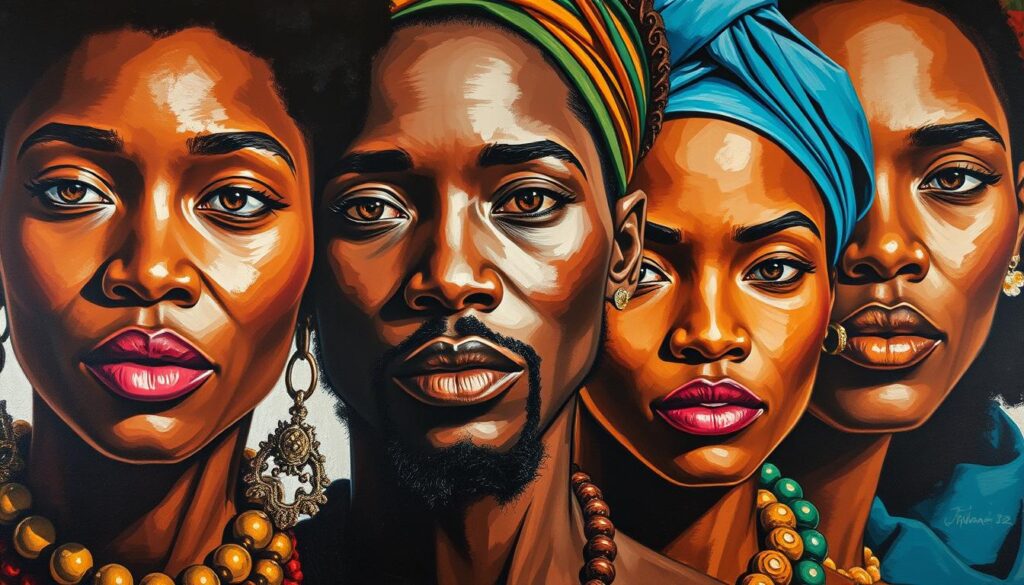
I’ll introduce you to three amazing artists who have changed the face of contemporary African art:
El Anatsui: Master of Transformative Art
El Anatsui is a leader in new art forms. His work breaks old rules, making stunning installations that show off African traditions. His pieces often use:
- Recycled materials like bottle caps
- Intricate textile-like compositions
- Powerful cultural narratives
Masijida Muvundja: Voices of Resilience
Muvundja’s art talks about tough social and political issues. Her portraits show deep emotions, making us think about identity and struggle.
Njideka Akunyili Crosby: Cultural Complexity
Crosby lives in Los Angeles and makes art that mixes personal stories with big cultural themes. Her work is a beautiful mix of:
- Nigerian heritage
- Contemporary global experiences
- Intimate personal storytelling
These artists show the amazing range and depth of contemporary African art. They invite us to dive into rich stories that go beyond borders.
Characteristics of African Portrait Art
African portrait art is a vibrant display of culture and storytelling. As someone who loves art, I find it amazing how African artists tell deep stories through their work.
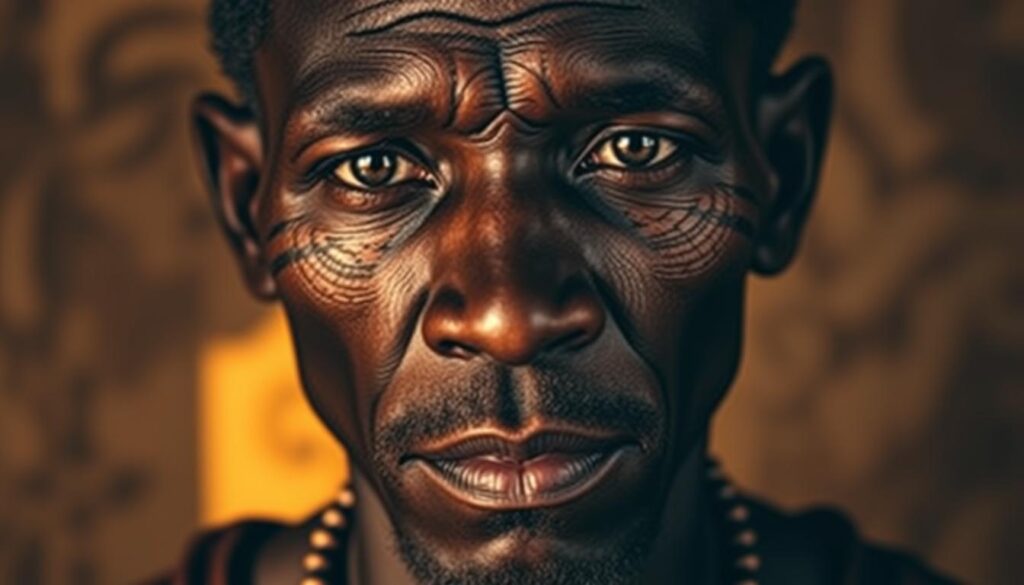
This art form is more than just pictures. It uses symbols, colors, and cultural values to share stories of identity and heritage.
Color and Patterns: A Visual Symphony
African portrait photography and art are known for their bold colors and detailed patterns. Artists use these elements to carry deep cultural messages:
- Vibrant colors that show emotions and spiritual states
- Geometric patterns that tell community stories
- Symbolic textures inspired by traditional textiles like Kente cloth
Representational vs. Abstract Styles
African portrait artists work in a wide range of styles. Some focus on realistic portraits, while others prefer abstract styles:
- Realistic Portraits: Show precise physical details
- Symbolic Representations: Highlight spiritual and cultural essence
- Geometric Abstractions: Use angular forms to stylize human figures
The power of African portrait art lies not in photographic accuracy, but in its ability to reveal the soul of its subject.
From wooden masks to sculptures and modern photography, African artists keep exploring new ways to create. Their work is both beautiful and full of meaning.
Techniques in African Portrait Art
African portrait painting is a mix of old traditions and new ideas. It shows how artists capture stories and cultures. As someone who loves art, I find it amazing how they do this.
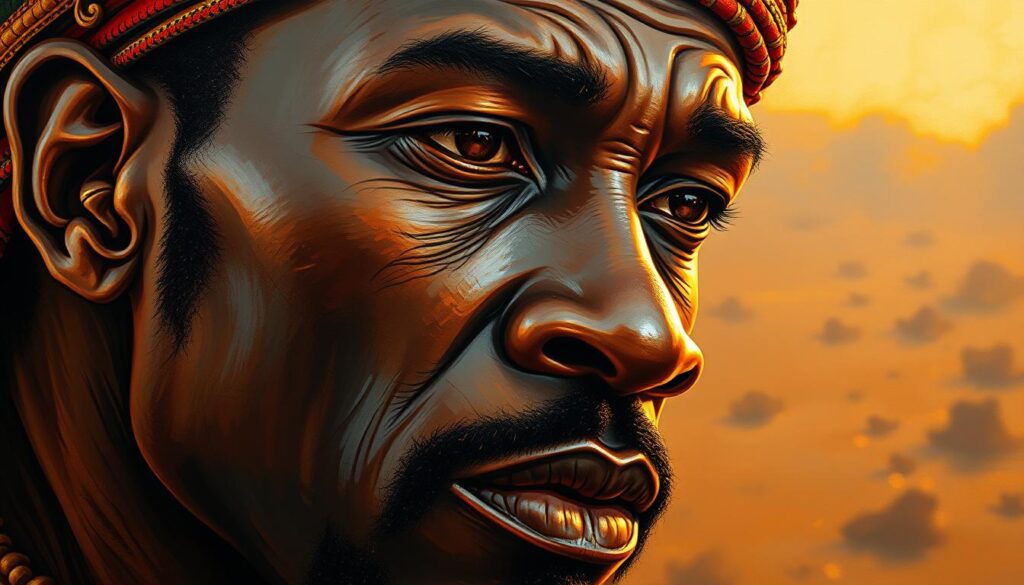
Artists in the African art gallery scene have found new ways to tell deep stories:
Traditional Crafting Methods
Traditional techniques include:
- Wood carving with symbols from culture
- Bronze casting that tells historical stories
- Textile art that shares family tales
Contemporary Creative Approaches
Modern artists like Delita Martin are changing how portraits are made by:
- Mixing different art processes
- Using techniques like collagraph and relief printing
- Adding symbols like circles and masks
Innovative Fusion Techniques
Artists now mix old and new methods, making dynamic visual narratives. Njideka Akunyili-Crosby is a great example. She uses photo transfers, collage, and personal images to show cultural depth.
By mixing tradition and innovation, African portrait artists keep exploring new ways to tell stories. Their unique methods make their art very powerful.
The Importance of Cultural Identity
African portrait art is a powerful way to explore and celebrate cultural identity. Traditional African portraits are more than just pictures. They tell deep stories of heritage, community, and personal experiences.
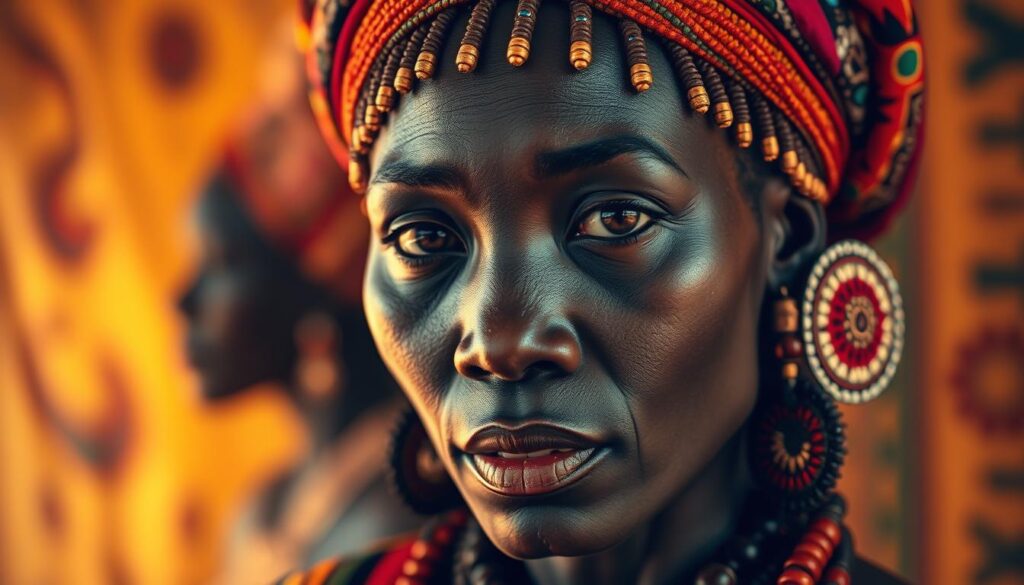
Cultural identity shines through in african paintings. Artists use special techniques to share deep cultural messages:
- Incorporating traditional dress and symbols
- Representing community histories
- Capturing spiritual and social connections
Portraits as a Reflection of Heritage
Traditional African portraits show more than just faces. They are visual archives that keep collective memories alive. They show cultural pride and tell complex social stories. Textiles like kente cloth from Ghana and mud cloth from Mali are key in these artworks.
Storytelling Through Art
Artists turn traditional African portraits into powerful storytelling tools. They mix old traditions with new techniques. This creates strong visual stories that fight stereotypes and celebrate diversity.
Art is not just about creating beauty, but about preserving and sharing our collective story.
With carefully made African paintings, artists keep documenting, challenging, and celebrating the rich African cultural experiences.
African Portrait Art in the Modern World
The world of contemporary African art is changing fast. It’s breaking new ground and grabbing the world’s attention. African portrait art has moved from old ways to new, bold forms. These new forms challenge our views and celebrate different cultures.
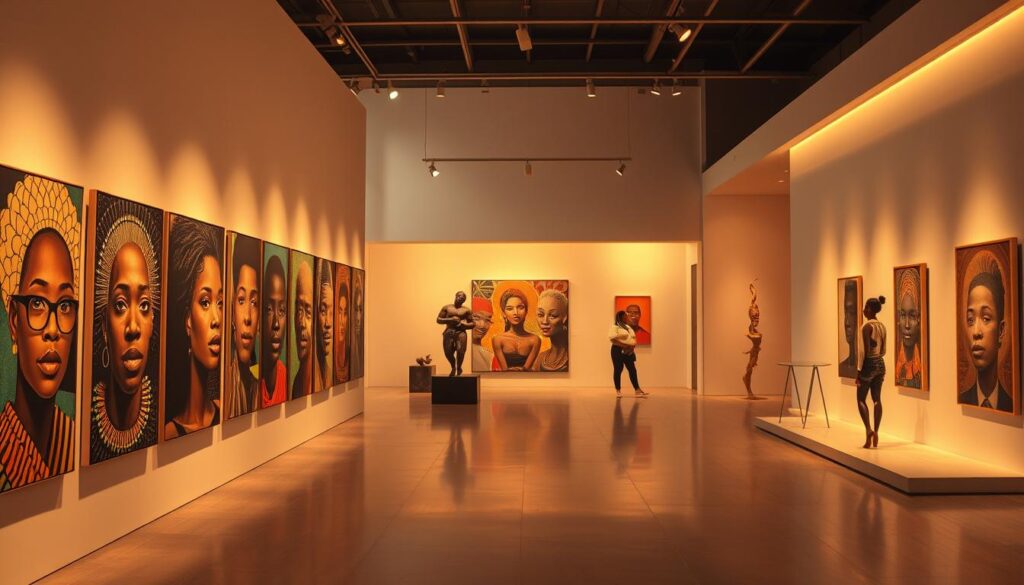
Digital platforms have changed how we see African art. Artists like Kehinde Wiley are telling new stories with their art. These stories go beyond borders and touch hearts worldwide.
Exhibitions and Galleries to Explore
Art lovers can dive into amazing contemporary African art at these places:
- National Gallery of Art, Washington
- Museum of Modern Art (MoMA), New York
- Smithsonian National Museum of African Art
- LACMA (Los Angeles County Museum of Art)
Digital Platforms and Global Accessibility
Online galleries and virtual shows have made African art more accessible. Sites like Artsy and Saatchi Art feature new African artists. They connect artists with collectors all over the world.
Global Impact and Influence
Contemporary African art is a strong voice for cultural talks. Artists use portraits to question old stories, explore who we are, and show the variety of Black experiences. It’s a powerful way to share and understand different cultures.
African art is not just a visual experience—it’s a profound conversation about history, identity, and transformation.
How to Collect African Portrait Art
Exploring African portrait art is thrilling for those who love art and collecting. Whether you aim to start a collection or find unique prints, knowing the basics is key.
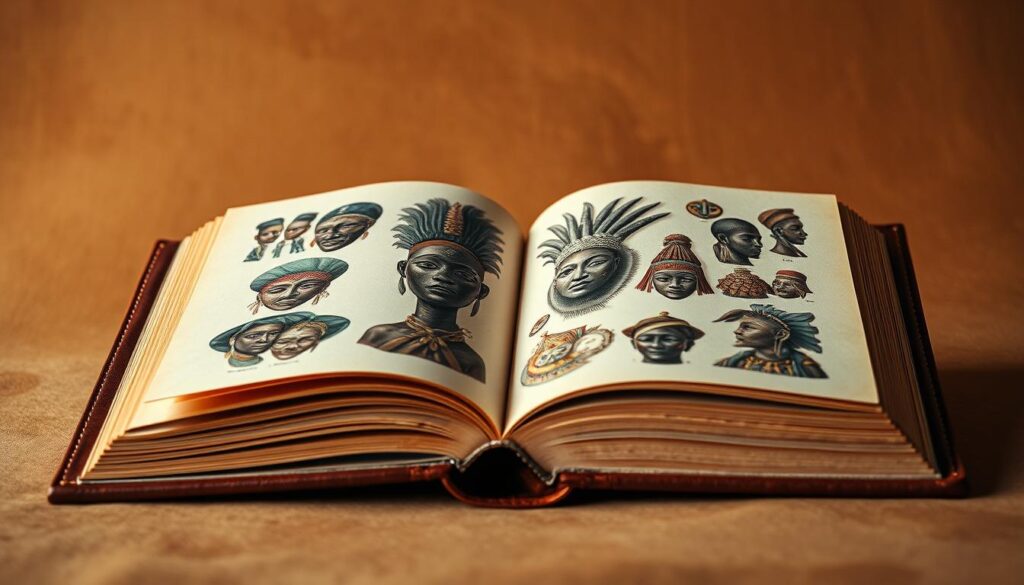
As someone who loves collecting art, I’ve found that building a collection takes thought and knowledge. Here are some tips to help you explore the world of African portrait art.
Understanding Authenticity
Authenticity is vital in art collecting. To find real pieces, keep these points in mind:
- Check the artist’s background and history
- Look for certificates of authenticity
- Learn about the artwork’s historical context
- Get advice from experts in African art
Tips for First-Time Collectors
Starting your collection doesn’t have to be hard. Here are some tips to start your journey:
- Decide on a budget for your purchases
- Begin with affordable prints
- Visit well-known galleries
- Go to art shows and cultural events
- Meet other collectors and artists
Collecting African portrait art is about passion, cultural understanding, and personal connection. Each piece has its own story, waiting to be found and loved.
Art is not just about owning a piece, but understanding the rich narrative behind it.
With thorough research and true interest, you can create a collection that honors African artistic diversity.
Supporting African Artists
The world of african artist portraits is full of life and color. It needs our support to grow. I’ve found amazing projects that are changing the game for african portrait artists everywhere.
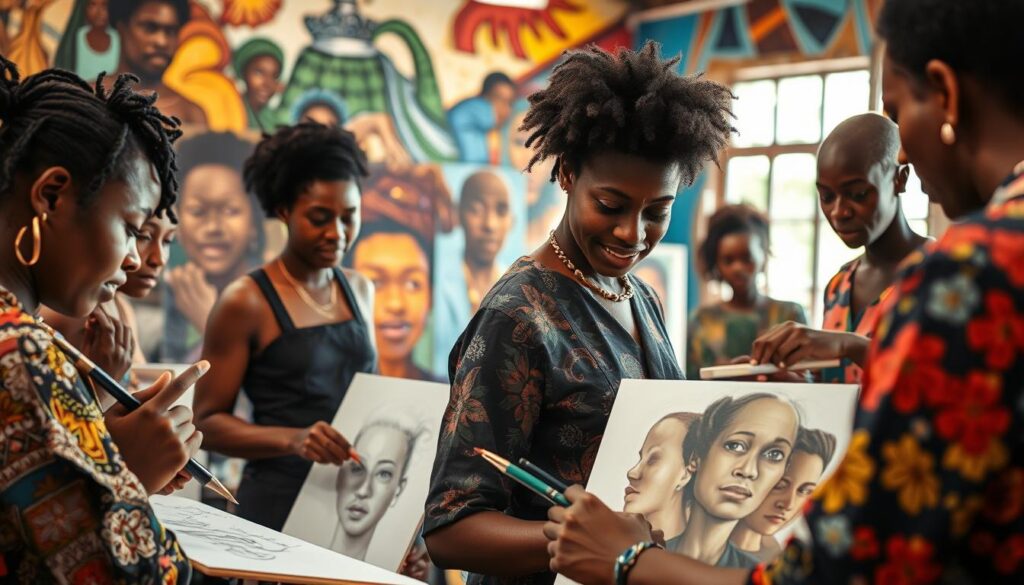
Many important groups are working hard to help artists grow. They include:
- The African Artists’ Foundation providing critical funding
- Artwatch Africa promoting artist rights
- RLabs giving digital skills training to creative pros
Empowering Creative Education
Art education is key for the next big names in african portrait artists. The Sindika Dokolo Foundation is setting up scholarships and mentorships for young artists.
Global Platforms for Recognition
International shows and online spaces are opening doors for african artist portraits. Places like ArtX Lagos and online galleries are helping artists reach a wider audience. This way, their work gets the praise it deserves.
Supporting African artists isn’t just about funding—it’s about creating ecosystems where creativity can flourish.
By backing these efforts, we can help African artists share their views. They can challenge old stories and keep pushing the limits of art.
The Future of African Portrait Art
I’m thrilled about the new trends in African portrait photography and painting. Artists like Sarah Waiswa are changing the game. They’re exploring themes of identity, isolation, and belonging in fresh ways.
Digital tools are making a big impact on African art. Artists use AI and online platforms to share their work worldwide. This opens up new ways to tell stories and show African culture.
Emerging Trends and Styles
Collaborations between artists from different cultures are key to the future of African art. Kehinde Wiley shows how mixing old and new can make a big impact. These partnerships are creating art that’s bold, diverse, and challenges the status quo.
Cross-Cultural Collaborations
The next wave of African artists is set to shake things up. They’re using tech, telling complex stories, and talking to the world. Their art is vibrant, speaks to today’s issues, and celebrates African heritage.
Source Links
- https://www.nicholashall.art/journal/a-portrait-that-survives-the-test-of-time/ – A portrait that survives the test of time | Nicholas Hall
- https://mycouture.africa/culture/kehinde-wileys-dazzling-portrait-extravaganza-a-glimpse-into-african-leadership/ – Kehinde Wiley’s Dazzling Portrait Extravaganza: A Glimpse into African Leadership – Couture Africa
- https://artsandculture.google.com/usergallery/the-human-form-portraits-in-african-art/ZQKyxL7yGnXEJQ – The Human Form: Portraits In African Art – Google Arts & Culture
- https://pressbooks.ulib.csuohio.edu/bright-continent/chapter/chapter-3-10-portraiture/ – Chapter 3.8 Portraiture
- https://www.famsf.org/stories/black-portraiture – Black Portraiture: Illustrating History’s Gaps
- https://blog.artsper.com/en/a-closer-look/10-african-artists-you-absolutely-must-know/ – 10 artistes africains à connaître absolument !
- https://www.contemporaryartissue.com/the-top-30-african-painters-you-need-to-know-today/ – The Top 30 African Painters You Need To Know Today – Contemporary Art Issue
- https://www.nytimes.com/interactive/2023/11/16/world/africa/african-artists-ruth-carter-mr-eazi.html – Meet the African Artists Driving a Cultural Renaissance (Published 2023)
- https://en.wikipedia.org/wiki/African_art – African art
- https://hyperallergic.com/262582/illuminating-the-history-of-west-african-portrait-photography/ – Illuminating the History of West African Portrait Photography
- https://www.artofchoice.co/lord-ohene-creates-recognizable-portrait-paintings-with-a-unique-technique/ – Lord Ohene Creates Recognizable Portrait Paintings with a Unique Technique – Art of Choice
- https://nmwa.org/press/delita-martins-large-scale-portraits-create-new-iconography-african/ – Delita Martin’s large-scale portraits create a new iconography for African American portraiture | National Museum of Women in the Arts
- https://artnetworkafrica.com/contemporary-african-portrait-artists-you-should-know/ – Contemporary African Portrait Artists from Different Countries You Should Know – Art Network Africa
- https://momaa.org/exploring-identity-through-african-art-perspectives-and-techniques/ – Exploring Identity Through African Art: Perspectives and Techniques
- https://www.tingatingaart.com/blogs/articles/the-role-of-african-paintings-in-shaping-cultural-identity?srsltid=AfmBOor8hr4bJd9t370zFiG01lBgiPb8W7ERHUVqdqUEs_hA3XNt1c0z – The Role of African Paintings in Shaping Cultural Identity
- https://edsitement.neh.gov/closer-readings/afro-atlantic-art-portraits – Afro Atlantic Art: Portraits
- https://berkeleyhighjacket.com/column/global-artists-kehinde-wiley-a-portrait-of-black-beauty – Global Artists: Kehinde Wiley, a portrait of Black beauty
- https://www.culturetype.com/2022/04/13/black-american-portraits-showcases-140-artworks-two-centuries-of-representation-across-geographies-and-diverse-practices/ – ‘Black American Portraits’ Showcases 140 Artworks, Two Centuries of Representation Across Geographies and Diverse Practices
- https://turnmeroyal.com/products/the-african-king-royal-portrait?srsltid=AfmBOopaUKHOEzfWzYeaPax7j5Iv61l6e-aGSjdnrDCqX0_7VnHpfIEN – The African King
- https://afrikanza.com/products/art-exquisite-african-art-paintings-art-printed-on-canvas – Exquisite African Portraits on Canvas.
- https://momaa.org/the-power-of-collaboration-african-artists-working-together/ – The Power of Collaboration: African Artists Working Together
- https://momaa.org/redefining-portraiture-african-artists-pushing-boundaries/ – Redefining Portraiture: African Artists Pushing Boundaries
- https://noma.org/exhibitions/new-african-masquerades/ – New African Masquerades: Artistic Innovations and Collaborations – New Orleans Museum of Art
- https://www.1854.photography/2018/11/portrait-of-humanity-meet-the-photographer-exploring-a-new-african-identity/ – Portrait of Humanity: Meet the photographer exploring a New African Identity – 1854 Photography
- https://nmaahc.si.edu/explore/exhibitions/afrofuturism – Afrofuturism
- https://hyperallergic.com/693573/self-portrait-as-future/ – Self-Portrait as Future
